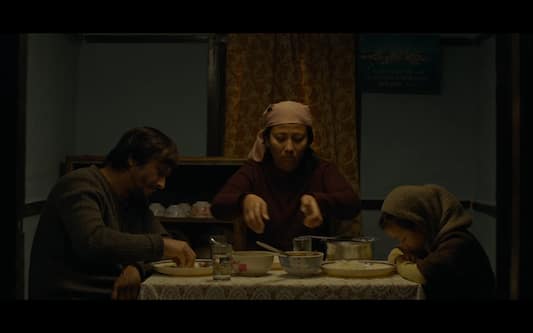



Making his debut as a feature film director just before the pandemic, Saurav Rai cast his entire family in the low-budget production in which he was forced to become an actor himself after one of the cast members unexpectedly quit at the last-minute.
Nimtoh (Invitation), the Nepali language film shot in his own village near Kalimpong, West Bengal, was even based on a personal story after someone stole the filmmaker's memory card from his own wedding.
"The spirit of Nimtoh was a guerrilla kind of filmmaking," recalls Rai, who graduated in direction and scriptwriting from the Satyajit Ray Film and Television Institute (SRFTI), Kolkata in 2015. "I ended up casting every member of my family in the movie, including myself," he says.
 A still from 'Guras'.
A still from 'Guras'.Nimtoh, the story of a 10-year-old boy yearning for an invitation to a wedding in his village, premiered at the Rotterdam film festival in 2020 and went on to win the Grand Jury Prize for Best Screenplay at the Jio MAMI Mumbai Film Festival in the same year.
Four years later, Rai has cast two of Nepal's biggest actors in his sophomore feature, set in a village near Darjeeling where he was born. Guras, which won the $10,000 (about Rs 830,000) Proxima Special Jury Prize at the Karlovy Vary Festival in the Czech Republic in July this year, tells the story of Guras, a nine-year-girl searching for her missing dog. Khagendra Lamichhane and Menuka Pradhan, both household names in Nepal, play the roles of Guras's parents, distressed farmers worrying about their land not giving them enough returns from their cardamom crop.
Part of the South Asia Competition at the Mumbai Film Festival, Guras, too, comes off another unusual episode in Rai's family. "We lost our dog during the pandemic. My family has a special relationship with animals and I was moved by my mother's perseverance in finding our dog," says the director about the point of departure for his new film.
The Nepali language film, which has its South Asia premiere at the Mumbai festival on October 31 (and also screens on November 1-3), employs cultural symbols and metaphors of the hill community to express its socio-economic setbacks.
"I liked to weave stories of ordinary people to etch out a minimalistic storytelling," says Rai, who used his memory of an earthquake as a one-and-half-year-old, an event no one else in his family felt, as the subject of his first short film, Gudh (Nest), which competed in the film schools' category of the Cannes festival in 2016. "But by using aesthetics and nature to flush out experiences," he adds. Half of the 114-minute movie was shot in a tea garden in Mirik, 30km from Darjeeling.
 A still from 'Guras'.
A still from 'Guras'."The film is a comment on the socio-economic and political changes happening in this mountain region and the human plight as a consequence," says Rai, who acknowledges the influences of filmmakers like G Aravindan, Buddhadeb Dasgupta, Iranian Abbas Kiarostami and Mexican Carlos Reygadas for their simplicity and humanistic approach and image references in his works. "I use the aesthetics of cinema to highlight these concerns."
Rai lived with his grandparents in Kathmandu until he was 11 years when he was reunited with his parents in Mangwa village, 30 km from Darjeeling. When Gudh was selected for Cannes, the whole Mangwa village proudly celebrated the moment.
"The socio-economic and political changes are not limited to the hills. It is happening everywhere. I use the hills as a deliberate model to pause this question to the audience: Do you think the modern consumerist model is good? Look at what it is doing to simple folks in the hills."
 Independent filmmaker and director of 'Guras' Saurav Rai.
Independent filmmaker and director of 'Guras' Saurav Rai.Guras, which won the Rotterdam festival's Hubert Bals Fund for development, is produced by LowIQ Production, an independent production house in Kerala, Nepalese producer Ram Krishna Pokharel (who has also produced The Red Suitcase by Nepalese director Fidel Devkota, another South Asian Competition entry at the Mumbai festival) and Sanjay Gulati of Crawling Angel Films (Lajwanti by Pushpendra Singh)
ALSO READ: Jio MAMI 2023 | ‘Everyone let the migrant workers down during the FIFA World Cup in Qatar’: Nepalese anthropologist-filmmaker Fidel Devkota"We got the opportunity to bring two superstars of Nepali cinema as actors in Guras because of Ram Krishna Pokharel," says Rai, who discovered Tulsi Khawas (who plays the title role) in a remote village near Siliguri. "Her village too was in the middle of mountains," he adds, referring to his new production's picturesque location of rolling mountains.
In the film, Twinkle, the Guras family dog, is considered as the little girl's sister. "When the real Twinkle (Rai's family dog) was poisoned, our family went through the pain for years. The dog was with us for 13 years," says Rai. "This film is a tribute to Twinkle."
Discover the latest Business News, Sensex, and Nifty updates. Obtain Personal Finance insights, tax queries, and expert opinions on Moneycontrol or download the Moneycontrol App to stay updated!
Find the best of Al News in one place, specially curated for you every weekend.
Stay on top of the latest tech trends and biggest startup news.